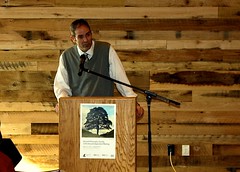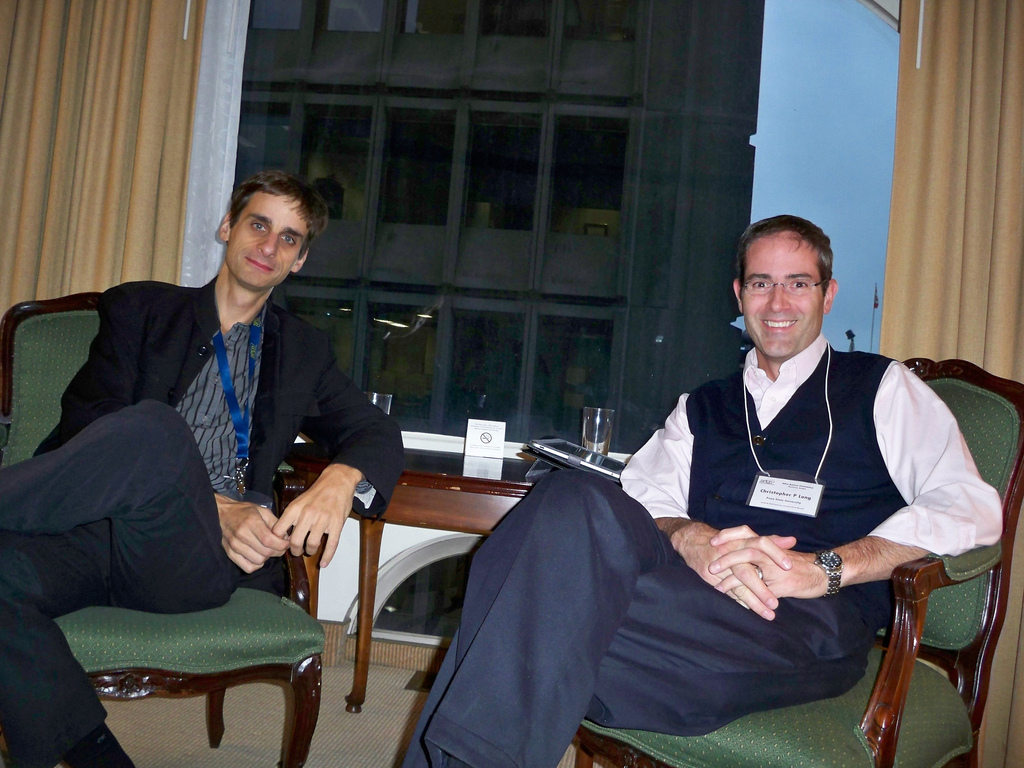Earlier this week, Frank Gonzalez published a review of my book, Aristotle on the Nature of Truth, in the Bryn Mawr Classical Review.
His review is the latest contribution to a decade’s long dialogue we have had about how to read Aristotle, the meaning of energeia and dynamis in Aristotle’s thinking, and the nature of Aristotle’s God.
Our conversation, which has always pressed me to articulate my position with more care and, I hope, more subtlety, extends back to the first gathering of the Ancient Philosophy Society at Villanova University in the Spring of 2001.
Mine was the first paper delivered there, later published in Epoché as The Ethical Culmination of Aristotle’s Metaphysics. That paper argued that Aristotle’s Metaphysics culminated not in the purity of God’s self-thinking, but in the more contingent and ambiguous principles articulated in Aristotle’s Nicomachean Ethics.
His was the first question I fielded. That question challenged me to think more carefully about the nature of God in Aristotle, and specifically it encouraged me to consider that perhaps God as “ἠ νοήσις νοήσεως νοήσις”, “the thinking of thinking thinking” (Metaphysics, XII.9, 1074b33-5), did not express the totalizing principle I ascribed to it.
Frank’s question haunted me as I completed my first book on Aristotle, The Ethics of Ontology: Rethinking an Aristotelian Legacy. But in that book, I continued to understand God in Aristotle as the activity of self-identity and thus, as I argued in an article published in Philosophy and Social Criticism entitled, Totalizing Identities: The Ambiguous Legacy of Aristotle and Hegel after Auschwitz, as a totalizing principle.
In his essay length review of The Ethics of Ontology in the Graduate Faculty Philosophy Journal, volume 26, issue 2 (2005), entitled, Form in Aristotle: Oppressive Universal or Individual Act?, Frank took me to task for failing to appreciate the radical otherness of God in Aristotle. There he wrote:
A genuinely third way of knowing [one that is neither anarchic nor totalizing] could have been found where Long refused to look for it: in the knowledge of what is most radically unique and Other; what, as the absolutely self-contained activity of life and thus pleasure, i.e., the unmoved mover or God” (GFPJ, 26.2, 2005: 181).
He was right to insist that I read Aristotle on God more closely, a project I explicitly undertake in chapter 7 of Aristotle on the Nature of Truth, but what is less clear on Aristotle’s own terms is the degree to which the thinking of God is radically other to human thinking or even, as I suggest in the Truth book, to human perceiving.
In fact, establishing the connection between the middle voiced activity of perceiving (αἰσθάνεσθαι) and the middle voiced activities of imagining and thinking is central to the argument of chapters four and five of Aristotle on the Nature of Truth. Recognizing that activity itself involves a kind of receptivity, as I mention in note 6 on page 118, caused me to reconsider my own interpretation of the hegemonic dimensions of divine identity in Aristotle. Yet, because my reconsidered interpretation continues to insist on a dimension of dynamis, or potency, in God, Frank, as our most recent discussions make clear, remains unsatisfied.
To hear some of the details of those more recent discussions, I would invite you to listen to Digital Dialogue 41: On Time and Motion in which I talk to Frank about his work on Heidegger’s interpretation of Aristotle, and his critique of Heidegger. There the discussion again gravitates to the meaning of God as energeia, or pure activity, in Aristotle.

Given his continuing critique, it was no surprise that Frank was the first to ask a question at the session the Ancient Philosophy Society held on Aristotle on the Nature of Truth this spring at Sundance.
His question asked about two key moments in the book where my voice and Aristotle’s seem to diverge. The first, of course, is in the discussion of God, where I continue to want to insist upon a dimension of dynamis in the divine; the second is the question of justice, which I want to extend beyond the inter-human realm to the relationship between humans and the things we encounter.
Listen to the six minute clip of our exchange at Sundance on the player at the bottom of this post, or by clicking the link below, which will open a new window:
Frank Gonzalez and Christopher Long at the 2011 Ancient Philosophy Society
The two issues Frank raises in that exchange are expressed also in his review in the Bryn Mawr Classical Review commentary. I have used Diigo to reply to specific points he makes in that review, and I invite you read that review with my annotations and sticky notes by following the link below:
Because my annotations speak to a number of the specific points Frank raises, here I would like to highlight an important dimension of the book that Frank does not even mention in the review: its peculiar methodology, which I refer to as “legomenology.”
I now realize in listening again to the recording of our exchange at the 2011 Ancient Philosophy Society that I did not respond to what was at the core of Frank’s important question about where and how my voice diverges from Aristotle in the book. The more critical moments of the BMCR review are animated by Frank’s insistance that my interpretation of truth in Aristotle “turns out to require some hermeneutical violence.” A better understand of the phenomenological legomenology I undertake in the book will suggest both how my voice diverges from Aristotle’s and how I seek to minimize the violence of my interpretation with candor when the things I say diverge from things that can be easily ascribed to Aristotle.
The legomenological method the book undertakes is rooted in the idea that the very attempt to put the truth of things into words articulates something of the truth.
With regard to the question of God in Aristotle, it is not simply a matter of reconstructing what Aristotle might have intended. In that case, I am inclined simply to agree with what Frank says at the end of the BMCR review that if my thinking is animated by the paradigm of dialogue, Aristotle’s is animated by the paradigm of self-identity. And yet, even on Aristotle’s paradigm of self-identity, and indeed, at the very moment when that paradigm achieves its most poignant articulation in the formulation “ἠ νοήσις νοήσεως νοήσις”, “the thinking of thinking thinking” (Metaphysics, XII.9, 1074b33-5), something of the dialogical truth is heard in the very way the idea comes to language.
This is the core of the argument of chapter 7, an argument that culminates with the sentence “God is relationality” (Aristotle on the Nature of Truth, 237). When I speak about “relationality” I mean to point to that which enables things to enter into relation with one another in the first place, perhaps I could call it the erotic site of relational happening … The formulation “ἠ νοήσις νοήσεως νοήσις” articulates and indeed declares the structure of relationality itself.
The legomenology I pursue attempts to remain attuned always to the truth in the things said, even if that means diverging from what the speaker might have intended. This point is an echo of the very thing Aristotle said about Plato in the Nicomachean Ethics, 1096a16-7:
… although both our friends and the truth are loved, it is more sacred to give truth the higher honor.
The legomenological method opened a path that allowed me, I hope, both to love Aristotle and to honor the truth. Frank very kindly notes at the beginning of his review that “[t]his is a highly original book both in its approach and its conclusions…” And if this is true, then its originality is rooted in a careful, caring reading of Aristotle, that remains, however, always willing to relinquish the attempt to reconstruct Aristotelian thought in order to undertake the yet more difficult attempt to articulate the truth.
That, indeed, is ultimately what is at stake in my ongoing discussion with Frank about God in Aristotle and about the meaning of justice. For it is not only the Aristotelian texts to which we must do justice, but in our ongoing dialogue with one another, we must attempt to speak the truth to and with one another.
I have gathered the various ways we have each attempted to do that over the years here in this post in order that it might provide fertile soil for further discussion in which the truth might not only take root, but grow.

